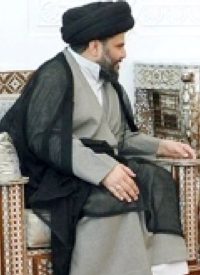
Approximately four years after fleeing Iraq in fear of arrest, Shiite cleric Moqtada al-Sadr is returning to Iraq in triumph. As the Washington Post reported on January 5, Sadr once fled to Iran, but now returns to Iraq with a significant bloc of power within the Iraqi government:
Sadr’s return comes just two weeks after Iraqi Prime Minister Nouri al-Maliki, also a Shiite, cobbled together a national unity government in which Sadr’s support proved crucial.
It was Sadr’s decision in October to support Maliki for a second term, in a deal brokered by Iran, that ended the political deadlock paralyzing the formation of a government after elections in March. In October, the two men embraced publicly at a meeting in Qom, ending years of bitter rivalry.
The Sadrist faction controls at least eight ministries in the new cabinet and has vowed to become a full participant in the political process.
Sadr once may have feared the power of American forces in Iraq, but apparently need do so no longer; as the Post reports:
Asked whether Sadr was still wanted by U.S. forces, Col. Barry Johnson, spokesman for Gen. Lloyd Austin, the commanding general in Iraq, said in an e-mail that Sadr “is not an issue pertaining to U.S. Forces-Iraq, and would be appropriately addressed by the Government of Iraq.”
Sadr’s return to Iraq comes in the midst of growing tensions within the country; the Christian minority is fleeing abroad and did not even dare to celebrate Christmas for fear of persecution. According to a story in the Guardian, some Christians “reported intimidation by members of the Mahdi Army, a Shia militia backed by the anti-American cleric Muqtada al-Sadr, who pressured them not to celebrate publicly.” The Sadrists have been striking a more accommodating tone publicly, but now that Sadr has returned to Iraq, it remains to be seen whether his arrival will mean a worsening of the plight of a persecuted Christian remnant which has already endured a series of bombings in recent days.
The growing role of Moqtada al-Sadr in a “post-American” Iraq is hardly a surprise to analysts. For example, in March 2007, an article for Vanity Fair quoted the assessment of the relationship between Maliki and Moqtada al-Sadr which was made by retired Col. W. Patrick Lang. Lang, a terrorism expert formerly serving at the Defense Intelligence Agency, offered an assessment which now appears to be coming true:
Lang predicts that tensions will escalate once the administration grasps the truth about Prime Minister Maliki. “They want him to be George Washington, to bind together the new country of Iraq,” says Lang. “And he’s not that. He is a Shia, a factional political leader, whose goal is to solidify the position of Shia Arabs in Iraq. That’s his goal. So he won’t let them do anything effective against [Muqtada al-Sadr’s] Mahdi army.” Recently, a complicated cat-and-mouse game has begun, with Maliki’s forces arresting hundreds of Mahdi militiamen, including a key aide to Muqtada al-Sadr. But there are many unanswered questions about the operations, which could amount to little more than a short-term effort to appease the U.S.
Now, with U.S. troops in the process of leaving Iraq, Moqtada al-Sadr is returning home to substantial political power — power that may never have come to him if the government of Saddam Hussein had not been overthrown. According to Reuters, the Sadrist movement captured 39 out of 325 seats in the Iraq parliament, meaning they represent a substantial bloc of power which cannot simply be ignored. Islam does not recognize a substantive division of “church and state,” and thus “religious” Sharia law regularly shapes “civil” law in Muslim societies.
Thus, even if Sadr positions himself as a “religious” leader in the coming days, that certainly does not mean he will step aside from a political role. His self-imposed exile the last four years in Iran may signal his own aspirations for the future of Iraq.
Photo: Iraqi radical Shiite cleric Moqtada al-Sadr meets with Syrian President Bashar al-Assad (out of picture) in Damascus, Syria, on July 17, 2010: AP Images



